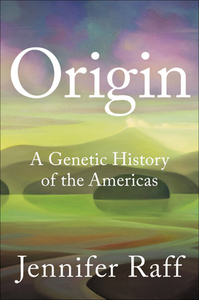Take a photo of a barcode or cover
adventurous
hopeful
informative
inspiring
medium-paced
adventurous
informative
reflective
medium-paced
A fine overview but I didn't think there was anything strikingly new here. I found all the sidebars a bit distracting.
hopeful
informative
reflective
medium-paced
This was a really interesting audiobook, with a great interview with the author at the end. She took a very interdisciplinary look at the "peopling" of the Americas, as well as the history of people studying the topic. Some of it veered into science well beyond my understanding, but it was still very engaging.
There were some stories and events that I think I'd prefer to hear from an indigenous perspective, but she definitely took care to emphasize when science and racism mistreated both the ancient and current people, and when researchers actually consulted and worked with indigenous people for a greater benefit.
There were some stories and events that I think I'd prefer to hear from an indigenous perspective, but she definitely took care to emphasize when science and racism mistreated both the ancient and current people, and when researchers actually consulted and worked with indigenous people for a greater benefit.
challenging
informative
reflective
medium-paced
There’s not much revelatory here although it was interesting on its release how the book gained a bit of traction as if it was showing some new data on new world expansion. There are way overlong passages with odd virtue signaling by the author that are quite cumbersome, and in the afterward she seems absolutely clueless when a fellow researcher confronts her about this, which the author seems to mistake as a sign of her passion of the topic.
informative
reflective
medium-paced
Very informative and thorough. I enjoyed how much attention she paid attention to the history of the relationships between scientists and Indigenous communities. However, it wasn't the best written. It was hard to follow at times with the amount of tangents and repetitive at other times.
A readable survey of past and current scientific thinking on the initial peopling of the americas by ancient indigenous groups. Raff is a geneticist with extensive experience sequencing ancient genomes and takes the reader deep in her lab. You leave the book with an understanding of how ancient dna can tell us so much about our shared human history, while balancing the desire to tell that story with the needs of contemporary indigenous peoples for whom ancient remains are sacred. Mind expanding and great!
challenging
informative
reflective
slow-paced
informative
fast-paced
Kind of a tough book to rate. Decently informative, but the tenor was often offputting.
To explain, some background. I'm a leftist who has read multiple books on CRT and think it has some good things to say but isn't perfect or totally close. Related? I don't think that everything nutters call "woke" is wrong. But I do think some things are.
And woke, the good, the bad and the ugly all run deep in this book.
I was "triggered," if you will, by something in the introduction. She talked about some Native Americans who believe "we've always been here." I knew, confirmed by footnote, she was referencing Vine Deloria. Along with that, she talked about "Indigenous science," setting it, in cases like this, against "Western science," and saying that she wasn't here to resolve these conflicts. Well, I've called out Deloria elsewhere. And, science has had its failures, ethical and otherwise. (I already knew about the Havasupai DNA testing.)
One or two digressions wouldn't be bad, but the book has a sidebar every 8-10 pages and half of them or nearly so are related to this.
==
OK, the actual informative parts.
I knew that Clovis was dead a full decade or more ago. But, how far back do we go before that? Raff has pretty solid DNA evolutionary evidence that humans were in the west end of Beringeria, modern Alaska, 25K years ago, before the peak of the Last Glacial Maximum. Like other recent research, she notes that traveling by boat would have worked around the ice sheets.
The White Sands footprint? She'd seen pre-print research by the scientists. Says the dating seems solid. So, humans were in the US Southwest by 25K years ago. Problem? Almost zero anthropological evidence in Alaska. For various reasons, we may never get a lot more. There is some in Eastern Siberia that goes older than that.
Next, based on DNA and other evidence, she talks about multiple waves of immigration, beyond what we know as a separate wave of Inuit and Aleut. Ties this to linguistics, noting that Greenberg and other "clumpers" are wrong.
New to me is that Clovis people apparently migrated north, from US South or Southeast, after development of Clovis toolkit. Lists a site in Florida that sheds further information on this.
For people who don't know that Clovis is dead, or that humans were likely in the Americas not just 15K years ago but 20-25K, this book would be reasonably informative. If you DO know that, there won't be a lot new here.
I'm not sure this book will be for your average reader or even your average non-fiction reader but if you have an interest in genetics or anthropology then this is a must read. Raff explores the varied theories about how indigenous Americans came to live in Alaska, mainland America all the way into South America. She details the evidence that has been uncovered for pre-Clovis people including tools, settlements and bones. She challenges the idea of the land bridge from Siberia and argues for a longer occupation of Beringia.
Most interestingly for me, she explores and argues the ethics of unearthing ancient people, discusses the impact of understanding genetic lineage for indigenous Americans and the breaches of trust and betrayals of the descendants of these people.
I really enjoyed this book and learned a lot. I'd suggest doing it on audio. While at times the sciencey parts can be a bit dry for the non-scientist, she does give sections that detail her own personal experiences to make the book more readable.
Most interestingly for me, she explores and argues the ethics of unearthing ancient people, discusses the impact of understanding genetic lineage for indigenous Americans and the breaches of trust and betrayals of the descendants of these people.
I really enjoyed this book and learned a lot. I'd suggest doing it on audio. While at times the sciencey parts can be a bit dry for the non-scientist, she does give sections that detail her own personal experiences to make the book more readable.








